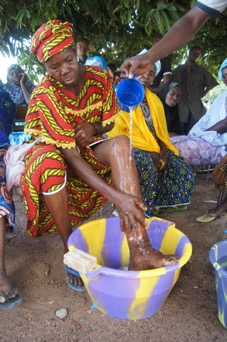Lymphatic Filariasis Training Program in Ghana Will Improve Care Access Nationwide
Dec 10, 2020
In partnership with Ghana Health Services, the AIM Initiative, a program of American Leprosy Missions, has successfully designed, implemented and evaluated a new, cascaded training program for lymphatic filariasis in northern Ghana which has led to significant improvement in morbidity management practices among health workers and people affected.
Lymphatic filariasis (LF) is a debilitating neglected tropical disease (NTD). It can lead to complications including severe swelling of the lower limbs, known as lymphedema, resulting in lifelong disabilities which affect the ability to work, access to services, and social inclusion, often with catastrophic economic consequences for people affected and their families. In 2016, the Ghana NTD Program implemented a program in the Upper East Region to train health workers and people affected in basic lymphedema management and disability prevention.
In 2018, we received funding from the Coalition for Operational Research on Neglected Tropical Diseases (COR-NTD) to work with the NTD Program and evaluate the initial project, as well as to design, implement and evaluate an enhanced, evidence-based training model in the Upper West Region of Ghana. Our team worked with the NTD Program to redesign the training model for lymphedema management and disability prevention.

Self-care is an important part of morbidity management for LF. Credit: WHO Aide Memoire, 2013.
Major improvements included:
- Addition of self-care training and training of family members
- Formation of self-care groups
- Inclusion of all levels of health staff, from hospitals to community volunteers, and tutors from nursing and midwifery colleges
- Introduction of new system of health data collection and reporting to the national level
Results from this project in the Upper West Region showed that quality of life was improved for participants. The robust end evaluation showed that patients practiced self-care more frequently and with more correct techniques than before the training program, and that they were supported by health staff and family members. Bright Alomatu, NTD program officer for Ghana Health Services, says, “I believe the cascaded training down to the community health persons and community drug distributors has increased access to care. Patients no longer have to travel over long distances to access care.”

Our Francophone Region Program Manager, Saidi Kashindi, at the MMDP survey dissemination meeting on 26 November 2020.
Funding
This project, Improving access to Lymphatic Filariasis MMDP services through an enhanced evidence-based, cascade training model for health worker capacity strengthening in Ghana, received financial support from the Coalition for Operational Research on Neglected Tropical Diseases (COR-NTD), which is funded at The Task Force for Global Health primarily by the Bill & Melinda Gates Foundation, by the UK aid from the British government, and by the United States Agency for International Development through its Neglected Tropical Diseases Program. ntdsupport.org/cor-ntd
